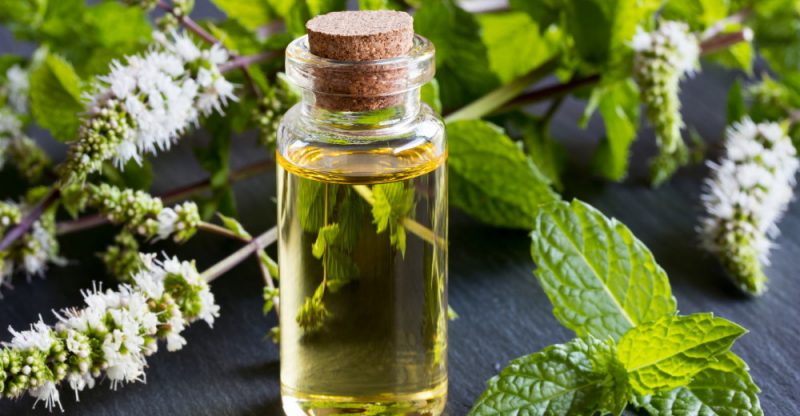Peppermint Oil Benefits
Peppermint essential oil is not just for sprucing up your morning tea or making your home smell like Christmas.
Adding this natural herbal treatment to your healthcare arsenal can help relieve a wide range of stomach problems, reduce pain and inflammation and treat everything from headaches to colic. Peppermint has been used for centuries to keep mouths healthy.
We now know it can be used to improve our skin, keep insects at bay and even boost our brain function and alertness.
Suppose you have been considering using peppermint essential oil as a topical treatment, aromatherapy, or nutritional supplement. In that case, we will discuss the many amazing benefits of this herbal remedy.
There are many ways that you can use peppermint oil in its various forms to improve your health and promote your mental and physical well-being.
Understanding Peppermint Oil
Peppermint essential oil comes from the Mentha piperita or peppermint plant, which is a hybrid of the water mint and spearmint species of herbs. The leaves of the peppermint plant contain potent natural oils, which are extracted using either cold press or CO2 distillation methods.
Peppermint is also available in other forms, including leaf extracts, peppermint leaf water, and pure or dried leaves from this plant. The active ingredients in peppermint that bring many health benefits are menthol and menthone. These two compounds have made peppermint a prized addition to centuries of herbal and traditional medicine practices.
While early European herbalists widely used it, it also has roots in Traditional Chinese Medicine and ancient Japanese healing. Peppermint has long been used for many purposes. It can now be found in many different foods and parts of personal care products, cosmetics, and medications. Peppermint is widely recognized for improving dental hygiene, lowering pain, reducing nausea, and improving inflammation and pain.
We will explore the many health benefits that have been discovered by medical researchers over the past two decades.
Health Benefits
Reduce Stomach Upset
For those who experience occasional or chronic nausea or vomiting, peppermint oil can help a great deal. This herb has long been used to help with motion sickness, morning sickness, and other causes of these digestive problems. However, researchers have recently discovered that the use of peppermint oil can even help patients undergoing chemotherapy or who have reactions to anesthesia.
In a 2013 study, researchers found that taking peppermint oil capsules helped lower both the frequency and intensity of vomiting caused by chemotherapy in some cancer patients. This could become an effective treatment for those undergoing cancer treatments, which can be hard on the digestive system.
Using peppermint oil for aromatherapy can also help with nausea. For example, researchers found that patients undergoing surgery experienced less nausea after receiving anesthesia when they had peppermint aromatherapy in their room. Pregnant women also experienced less intense vomiting when they used peppermint oil for aromatherapy.
Improved Respiration and Sinus Health
Using peppermint oil for aromatherapy can help to reduce sinus congestion while also helping to relieve sore, scratchy throats. By acting as an expectorant, peppermint thins mucus, making it easier to clear from the airways. Using peppermint oil when you have a cold or the flu can shorten your illness and help you breathe easier while you are ill.
Since peppermint oil also has antimicrobial properties and is a natural antioxidant. It can even help rid your body of the infection that makes you ill. This is also good news for seasonal allergy sufferers.
Peppermint oil relaxes muscles and helps clear mucus, resulting in discomfort and difficulty breathing during allergy season. Peppermint oil also works as a natural anti-inflammatory for those with chronic allergies, bronchial asthma, and other forms of chronic inflammation. This can reduce the frequency and severity of symptoms.
Treats Many Gastrointestinal Disorders
In addition to relieving common nausea and vomiting, peppermint oil can also help to treat many bowel and stomach disorders, including many chronic conditions.
The menthol in peppermint oil effectively relaxes the smooth muscles of the intestines and stomach, which can ease the symptoms of diseases like irritable bowel syndrome (IBS) small intestinal bacterial overgrowth (SIBO) dyspepsia. In a meta-analysis of the data on IBS and peppermint oil, a 2007 study concluded that there is some evidence to suggest that peppermint oil can help relieve some symptoms of IBS, including stomach pain and excess gas. In addition, the reduction in stomach pain caused by peppermint oil was also confirmed in a 2007 study of IBS patients.
This same study also noted improvements in other digestive symptoms, including bloating, constipation, and diarrhea. Many cases (up to 80 percent) of IBS result from an overgrowth of bacteria in the intestines, which produces excess gas and can cause many of the symptoms of IBS. By reducing the production of this gas, patients can experience less pain, bloating, and other effects of this overgrowth.
Reduces Inflammation and Relieves Pain
Anyone with chronic pain, back problems, or other inflammatory issues, knows that finding relief is crucial. You can use peppermint oil to help treat certain types of pain. For example, topical application of peppermint oil combined with wintergreen has been shown to help reduce pain with fewer side effects than taking NSAIDs or other conventional medications to relieve pain.
Ointments containing peppermint oil have been shown to relieve muscle and joint pain. Many over-the-counter and herbal remedies for muscle pain include peppermint as one of the active ingredients. Peppermint oil can help reduce pain and lower inflammation by relaxing muscles and helping to inhibit the inflammatory response, which can result in pain.
The menthol in peppermint oil is also helpful for relieving muscle spasms, which are sometimes the cause of muscle pain. Peppermint can effectively prevent spasms or reduce symptoms when these contractions occur by relaxing muscles and blocking calcium channels to muscles.
This effect is even noted internally when peppermint oil is given via an enema. It effectively reduces intestinal spasms, which can inhibit certain medical procedures.
Enhances Oral Health and Freshens Breath
Peppermint has been used for generations to keep mouths healthy and to smell fresh. Because it has antimicrobial properties, it can stop the growth of bacteria that lead to infections and the formation of plaque, which can cause gingivitis.
By stimulating the salivary glands in the mouth, peppermint also reduces dry mouth, which is the leading cause of bad breath.
Relieve Infantile Colic
Colic is a frustrating disease for parents because it can be very challenging to treat. It results in irritable, restless, fussy infants. Colicky babies often cry for hours without satisfying their discomfort. It is not known what causes this condition.
However, some doctors believe that restlessness is caused by stomach pain or discomfort. In addition, researchers have discovered that infants who were treated with peppermint oil saw decreases in episodes and less crying.
It is unknown if this treatment could work over more extended periods, so additional research is needed.
Naturally Repels Insects
Many insects and rodents do not like the smell of peppermint oil, making it a natural insecticide and insect repellant.
Among the essential oils that are known to repel common insects like mosquitos, spiders, and ants, peppermint ranks among the most effective, along with lemongrass, cedar, thyme, clove, and patchouli.
Because mosquitos carry many dangerous diseases, including malaria and yellow fever, this is great news for anyone looking for a safer, more natural alternative to commercial insect repellants.
Recent studies have shown that peppermint oil completely protected subjects from mosquitos for up to 150 minutes with minimal application on the arms.
Reapplication is necessary after this period, however, as the efficacy drops off sharply.
Reduces Skin Irritation and Itching
Up to 8 percent of pregnant women experience severe itching in various parts of their skin. Because most women want to avoid using chemicals or medications during pregnancy, natural alternatives are often desired.
Peppermint oil has been shown to help reduce itchiness in pregnant women with pruritus gravidarum, with a significant drop in itching severity. Unfortunately, severe skin irritation and itching are also common among burn victims.
Researchers found that the application of a treatment that included peppermint oil was effective in helping relieve these symptoms in a significant number of study participants.
Improve Skin Health and Heal Damage
Because of its antimicrobial and anti-inflammatory properties, peppermint oil could also be used to treat other skin disorders, including dermatitis, sunburn, scabies, and ringworm. It could also help to reduce both the infection and inflammation that cause acne. This herbal treatment could also be used to treat minor sunburns and prevent further sunburn or damage from UV rays.
Peppermint oil is an excellent moisturizer that hydrates skin, relieving sunburn pain.
The SPF value of peppermint oil is higher than most essential oils, which means it could be added to a natural sunscreen to boost its ability to protect your skin from the sun.
Relieves Headache Pain
For some types of headaches, peppermint oil can be an effective pain reliever.
When applied topically to the scalp, temples, or neck, peppermint essential oil has been shown to reduce the intensity of headache pain significantly. It was even found to be as effective as some medications, including acetaminophen. In addition, when combined with eucalyptus oil, peppermint oil successfully reduced headache pain and muscle tension in another study.
This treatment is not effective at dealing with migraine headaches, although it does help to reduce pain sensitivity in many people.
Boosts Cognition and Brain Function
Another possible health benefit of peppermint oil is improving brain activity and boosting brain function.
In a 2008 study, researchers found that smelling peppermint helped enhance participants’ memory while also boosting their attention rate, recognition, and overall performance on a memory task. The same effects were not noted when peppermint tea was used, though.
This could mean that aromatherapy is better delivery of peppermint for this purpose. In another study, when subjects inhaled peppermint aroma, they were able to perform better on a speed and accuracy test, indicating that this aroma can increase attention and arousal, which boosts performance on certain types of mental tasks.
Improves Alertness
For those who have daytime sleepiness or fatigue, peppermint oil could help to provide some relief.
When placed in a darkened room, participants who smelled peppermint reported less sleepiness than those in the control group, even when their reported initial sleepiness was the same as the other group.
Researchers did not examine the influence of peppermint on nighttime drowsiness, so these results cannot be applied to delaying the onset of sleep at night.
One of the other benefits of improved alertness is that you feel better able to handle and manage stress levels.
Peppermint oil’s refreshing and uplifting nature can ease mental exhaustion from stress, helping you better cope with anxiety and other mental health issues that are made worse when coping with stress.
Reduces Hair Loss and May Improve Hair Growth
People suffer from hair loss for many different reasons.
Malnutrition, changes in hormone levels, age, and other medical conditions can all contribute to thinning, hair loss, and bald spots. You may be able to use peppermint oil to reduce hair loss and even regrow new hair in some cases.
In animal trials, peppermint oil was shown to be more effective than even prescription hair loss treatments at regrowing hair and beating out minoxidil, which is a typical, FDA-approved hair loss treatment. The mechanism of action is the ability of peppermint oil to increase the production of IGF-1, which supports the growth and survival of cells.
Hair can grow thicker and stronger, enabling it to grow longer.
Improve Immunity and Fight Disease
The compounds found in peppermint are natural antioxidants, which means that using this herbal treatment can help you fight disease and the effects of aging and free radicals within the body.
Among the compounds found in peppermint, rosmarinic acid is a potent antioxidant that can reduce inflammation and help you fight diseases, including cancer.
The peppermint you take must still contain the phenolic compounds found in the plant itself to have these antioxidant effects. Various processing and extraction techniques can affect the concentration of these compounds.
Peppermint oil can also help keep you healthy and fight disease because it has antibacterial and antimicrobial properties. In addition, it is effective at inhibiting various fungi and some common bacteria that can make you ill. For example, peppermint oil has been shown to inhibit the production of bacterial toxins in many strains of Staphylococcus aureus. Some of these strains have been proven to resist antibiotics.
Peppermint is not effective against all types of bacteria. Additional research is needed to determine its possible use in treating disease. For example, Candida albicans is a type of yeast that causes many problems in the human body when it becomes overgrown. Peppermint oil may become a reliable treatment for reducing this yeast.
More research is necessary to determine the appropriate dose for using this essential oil to treat this yeast infection.
Boosts Athletic Performance
There is some evidence to support the use of peppermint oil to improve athletic performance by increasing endurance and reducing fatigue.
In a 2013 study, participants were given a treadmill test as a baseline measurement. Then, for the next ten days, each took peppermint oil supplements and then repeated the same treadmill test.
The second test results indicated significantly improved performance for the group taking the peppermint oil, with participants being able to run longer, with reductions in blood pressure and heart rate.
In additional studies, the effects of peppermint oil were measured much sooner, and the results showed improvements after supplementation after just five minutes. These results lasted up to one hour. This study tested reaction times, the distance for jumping, grip strength, and many other variables.
It is believed that peppermint oil relaxes the body’s smooth muscles, which reduces blood pressure and lactic acid buildup, thereby influencing performance and stamina.
Improves Blood Circulation
The enhancements of athletic performance and some of the other benefits of peppermint oil may be due to a boost in blood circulation and, therefore, increased oxygen levels.
When you breathe in the aroma of peppermint oil, research has concluded that the olfactory nerve instantly increases blood circulation throughout the body. This provides your cells with more oxygen, which results in improved metabolism. Better circulation influences brain function, muscle stamina, and many of the other conditions previously discussed.
Could Help Fight Cancer
One promising study suggests that peppermint oil may be a possible treatment or prevention for prostate cancer. This 2009 study showed that menthol, the active compound in peppermint, can inhibit prostate cancer tumor growth.
More research is needed to understand this mechanism of action and to consider how peppermint could be used in cancer treatment.
Precautions and Interactions
The dosage for peppermint oil depends on the type of supplement you are taking and the delivery method. Talk with your doctor about the best way to take peppermint oil for your specific condition and never exceed the medical recommendations.
While peppermint oil is generally considered to be safe, taking it in excessive amounts can result in adverse effects. Always follow your doctor’s recommendations. Research has shown that the optimal dose for certain conditions varies. For example, patients with IBS seem to do best when taking between two-tenths and four-tenths milliliters, three times per day, by a coated capsule that disintegrates in the intestines.
The enteric coating on these capsules allows the pill to remain intact until it reaches the intestines. As a result, they benefit most from the oil’s calming effects. Using peppermint oil’s most common side effects include dermatitis, heartburn, vomiting, nausea, difficulty breathing, and blurred vision.
Taken in large doses, it can cause damage to the kidneys and liver, so always follow the dosage instructions. It can become toxic when taken in excessive amounts because peppermint contains menthol, which affects the transfer of carcinogens and toxins through the esophagus. It can increase smokers’ exposure to cancer-causing agents and other harmful chemicals in cigarette smoke.
If you have gallbladder problems or a history of gallstones, you should not take peppermint oil. This herb is known to increase the production of salts and bile from the liver, which your gallbladder must then store. In addition, if you are anemic and take iron supplements, do not drink peppermint tea, which can inhibit your ability to absorb this mineral.
When applying peppermint oil to the skin, always mix it with a carrier oil to reduce the risk of skin irritation.
If you develop a rash or have an allergic reaction to using peppermint oil, stop using it immediately and see your doctor. In addition, Peppermint oil has not been adequately tested on infants, children, or pregnant women. Therefore, these populations should avoid taking this supplement until further research verifies its safety.
Conclusion
Peppermint is a natural plant that has been used for centuries to treat a wide range of problems. This hybrid species is high in menthol and other potent compounds that benefit the body. These include fighting infection, boosting immunity, enhancing energy, relieving pain, and thinning mucus.
Adding peppermint oil to your healthcare routine can allow you to enjoy fewer sore muscles or joints, less severe headaches, easier breathing, improved digestion with fewer distressing symptoms, and fresher breath. In addition, Peppermint can be used to help treat colic, regrow hair, relieve itchiness and repel insects. It is easy to understand why peppermint has long been a part of medical traditions.
Taking peppermint oil is safe unless you are allergic to it or take it in excess. After that, it is safe for nearly everyone unless you have gallbladder problems or take iron supplements.
FDA Compliance
The information on this website has not been evaluated by the Food & Drug Administration or any other medical body. We do not aim to diagnose, treat, cure or prevent any illness or disease. Information is shared for educational purposes only. You must consult your doctor before acting on any content on this website, especially if you are pregnant, nursing, taking medication, or have a medical condition.
HOW WOULD YOU RATE THIS ARTICLE?






